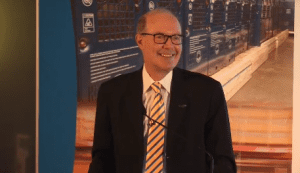Plug Power CEO Andy Marsh Featured in ‘Temple Engineering’ Newsletter
Andy Marsh, CEO at Plug Power Inc., graduated from the College of Engineering at Philadelphia’s Temple University in 1982. It’s no surprise that his alma mater put Andy in the spotlight this year, with a feature piece “Making the Leap from Engineer to Entrepreneur” in the Spring 2015 edition of its quarterly newsletter, Temple Engineering.
Below is an excerpt of the Newsletter staff article based on their interview with Andy
Andy Marsh has focused on power supply issues since his college days, when Professors Brian Butz, Edward Calhoun and Victor Schutz sparked his interest in how to best power electronics. An introduction by Butz led Marsh to his first job with AT&T and Bell Laboratories, where – during the firm’s transformation into Lucent Technologies – Marsh rose to become director of research and development.
In 2001, Marsh co-founded Valere Power in a Dallas suburb with a sophisticated concept he was developing to provide direct-current systems to power broadband server and storage applications. With Marsh as its CEO, the company grew into a multi-national operation with more than 200 employees and annual revenues of more than $100 million from customers such as Verizon and Time-Warner. “We were probably powering 80 percent of the broadband applications in the country by 2008,” says Marsh.
That year, after a $250 million sale of the company was finalized, Plug Power of Latham, New York (near Albany) recruited Marsh to become its president and CEO. Today, as an alternative to diesel engines or lead-[acid] batteries, Plug Power is powering lift trucks with hydrogen fuel cells for customers such as Walmart, Kroger, BMW and P&G.
“We’ve taken a technology concept and created a market where none ever existed,” says the Willow Grove, Pennsylvania, native.
During a recent 18-month period, the firm’s market capitalization grew from $10 million to $900 million. In its largest deal so far, Walmart is paying approximately $50 million to convert seven of its distribution centers to hydrogen fuel cells. Instead of taking 15 minutes to replace 2,000-3,000-pound batteries every six hours, it takes only two minutes to refuel a hydrogen [fuel] cell. Workers at Walmart’s Pottsville, Pennsylvania, facility are now accomplishing in seven hours what used to require eight hours. “What we’re really selling is productivity,” Marsh says.
With hydrogen stored outside, the need for large interior battery storage areas also has been eliminated, and the technology helps companies meet greenhouse gas reduction goals.
“I also earned degrees from Duke (MS EE ’87) and SMU (MBA ’98), but I really learned the fundamentals of engineering quite well at Temple,” says Marsh. “I don’t think I could have done anything in my career unless I had received that training to be a skilled engineer.
“And a lot of business involves dealing with practical issues and engaging with other people. The Temple student body is really diverse, and there’s value in not just being with people who think like you.”

